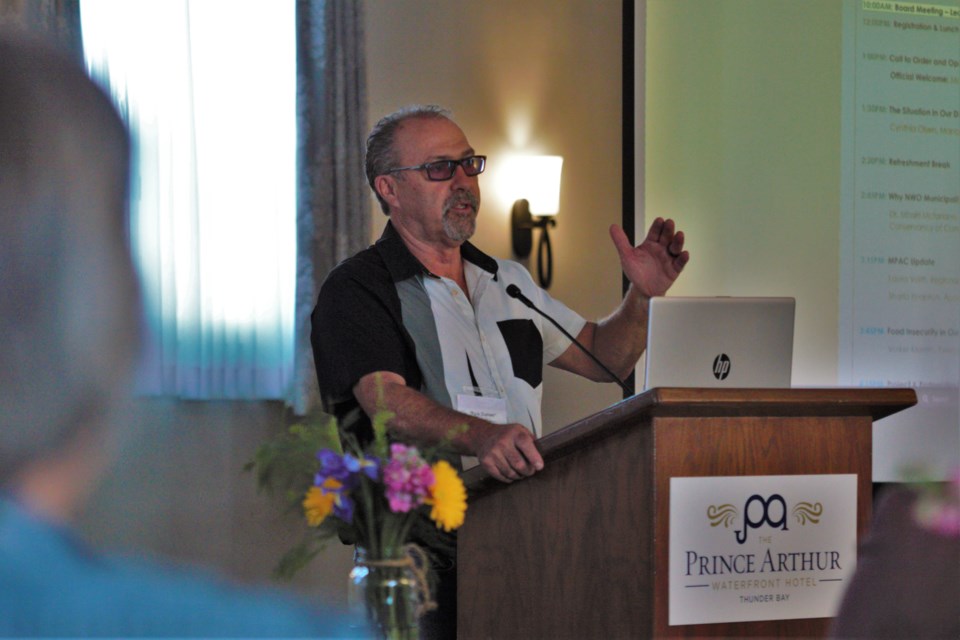THUNDER BAY – The first face-to-face meeting of the Thunder Bay District Municipal League saw local leaders gather in Thunder Bay this week, looking to find common ground on issues ranging from taxes and mining to addictions and paramedic services.
Mayor Ken Boshcoff gave an official welcome to leaders assembled at the Prince Arthur Hotel, saying it’s clear communities in the region will spend the coming years continuing to grapple with challenges including the opioid crisis and economic recovery from the pandemic.
However, he also pointed to opportunities including a mining boom, and said the region was far from alone in facing those problems.
“We’re going to show the world how to solve them,” he told the group of leaders.
Mayor Rick Dumas of Marathon, who’s served as the league’s president for close to a decade, said holding the conference in person for the first time in three years set the stage for greater relationship-building and cooperation.
That’s especially important after a municipal election that saw fresh faces elected to municipal councils, he said.
With 83 participants representing all 17 municipalities in the district, conference attendance was among the highest in years, Dumas noted, saying that showed the importance of the relationships between area communities.
“Like I said to the group and Mayor Boshcoff, the city’s very important to us, but we’re also very important to the city. We bring the economics into the city, and we also use the city’s services such as medical, legal, economic opportunities. It’s a great partnership, and we work together.”
Dumas said while speeches from MPPs might steal the spotlight at the conference, less headline-grabbing elements like a presentation from the Municipal Property Assessment Corporation (MPAC) are equally important.
The agency updated municipal leaders on plans for its first property assessment since 2016 are important opportunities for regional leaders.
“I’m getting those questions already, how is that going to reflect on my taxes?” Dumas said. “So each and every one of the things on the agenda, I believe, is going to be important to all of the municipalities throughout the region.”
Another highlight of the conference was a presentation from Superior North EMS chief Shane Muir, which comes amid fallout from the paramedic agency’s controversial decision to consolidate ambulance bases in North Shore and Greenstone communities.
Attendees also heard presentations from the Thunder Bay District Social Services Board, Regional Food Distribution Association, and Cynthia Olsen, a City of Thunder Bay staffer who coordinates the area drug strategy.
In a presentation entitled ‘The situation in our region,’ Olsen updated leaders on staggering spikes in data showing the extent of the opioid crisis, and outlined what the city and local agencies are doing to respond.
Paramedics responded to 726 suspected opioid overdoses in the district in 2021, up more than 50 per cent from the year before, with most in the city of Thunder Bay.
Overall, that figure has increased by more than 650 per cent over the last five years, Olsen said.
The fallout from an increasingly unreliable illicit drug supply shows no signs of easing, with Olsen pointing to a significant increase in drug alerts since the beginning of this year.
“Almost every two days, there was an alert, and over the course of a week, there were 18 overdoses,” she said. “I don’t know if those overdoses were fatal or not, but I anticipate our 2023 data to show some corresponding emergency response… and perhaps an increase in death.”
“While communities are doing what they can with the resources they have to address the opioid crisis, we can clearly see that deaths continue to rise,” she continued. “So what more should we consider?”
Olsen pointed to recommendations from the Drug Strategy Network of Ontario that have been endorsed by municipalities including Thunder Bay.
The recommendations include expanding addictions treatment services, embracing harm reduction approaches like safe supply and decriminalization, and providing real-time data on drug poisonings.
The network’s suggested “public health approach” reframes the opioid crisis “as a solvable problem,” said Olsen.
